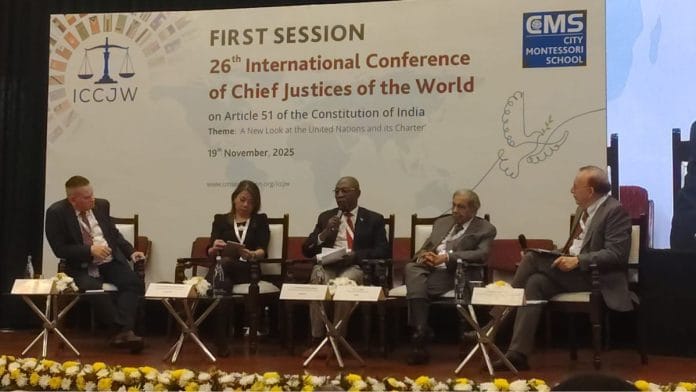New Delhi: It is not often that the world’s top diplomat admits to feeling powerless. But, in a quiet conversation with NK Singh, UN Secretary General Antonio Guterres offered a startling confession: “I have far less power than you, NK. My authority begins and ends with convening a session of the United Nations.”
While sharing this anecdote at a panel discussion on UN Reforms, NK Singh, Chair of the 15th Finance Commission, underscored a larger point: “Across human civilisation, institutions have always sought to represent society. But through the ages, it is also evident that those institutions that are unwilling to change with the dynamic scenario die inevitably.”
Singh was speaking at the 26th International Conference of the Chief Justices of the World, organised by City Montessori School, Lucknow, at Delhi’s India International Centre on Wednesday.
Economist Augusto Lopez-Claros led the discussion, which featured an eminent lineup of speakers — former Prime Minister of Lesotho Pakalitha Bethuel Mosisili, NK Singh, Justice Rosa Acon Ng of the Supreme Court of Costa Rica, and Justice Ricardo Li Rosi of Argentina’s National Civil Court of Appeals — who explored the theme A New Look at the United Nations and its Charter.
The chief guests of the event were Lok Sabha Speaker Om Birla and Rajya Sabha MP Sudhanshu Trivedi. The event brought together 20 sitting and former Chief Justices from around the world, along with senior judges and delegates representing 52 countries.
As the discussion unfolded, a clear undercurrent emerged in the panel. Mosisili said that “the current structure of the United Nations is faltering under the weight of modern challenges. ”
“We live in a strange democracy, where the world is led by the undemocratic United Nations Security Council (UNSC). I don’t see any chance to amend the UN Charter till the Permanent Five members hold a veto power,” he added.
A reformed UN
The United Nations was created in the aftermath of the Second World War to safeguard global peace, but in a rapidly changing world, it has struggled to resolve many long-standing conflicts. This prompted Augusto Lopez-Claros to ask a fundamental question which is at the heart of current debates: Is the UN Charter still adequate for the challenges it faces today, or is a deeper rethinking overdue?
Justice Rosi, responding to the question, highlighted two pillars of international law: the making of agreements and their enforcement. While the world has mastered the art of drafting and signing agreements, it has consistently failed on the enforcement front. This enforcement deficit, he argued, has reduced the UN to a toothless tiger. Therefore, the UN institution is increasingly unable to resolve the very disputes it was created to address.
“The United Nations was built on a template even weaker than that of the League of Nations. Unsurprisingly, it has struggled to resolve wars, but it has managed to survive as an institution. The League, however, collapsed when Mussolini’s Italy marched into Ethiopia. That invasion delivered one of the decisive blows that doomed the League of Nations,” said Justice Rosi.
Also read: Nehru Archive won’t ask Sonia Gandhi for unpublished work
National sovereignty
The conversation then moved to the concept of sovereignty as the guiding principle of international laws, given that crimes today, such as transnational trafficking, digital frauds, terrorism, and illicit narcotic supplies, are not confined by borders.
“The concept of sovereignty has to change with the changing times. The world has become far more globalised compared to the times when the idea of sovereignty was born. Today, Europe is considered a prosperous continent because it shares its sovereignty in Brussels on multiple policy issues,” said Justice Ng.
“I come from a country which protects fugitives under the garb of sovereignty. It is wrong for world peace,” the judge added, hinting at Costa Rica’s extradition law, which protects its citizens from being extradited for serious offences such as international drug trafficking and terrorism. However, the law was amended in May this year to allow the extradition of Costa Rican nationals.
Vaibhav Pant is an alumnus of ThePrint School of Journalism, currently interning with ThePrint.
(Edited by Aamaan Alam Khan)






